Whether it’s a quick day trip, a cross country bus ride, or a long haul flight, travel offers a thrilling way to explore the world. If you don’t have experience, a short drive might make you feel tense instead of relaxed.
From booking the perfect best value airline ticket to choosing the right travel agency or travel agent, a little help can go a long way in making your experience smoother. If you’re heading abroad, don’t forget to check your travel visa requirements and grab some travel insurance, as safety should always be part of the plan.
Smart planning means more than just packing a suitcase or bag. It’s about maximizing your time (and budget), whether you’re into relaxing getaways or high speed adventures. For business travel, efficiency is key; for leisure, it’s about finding those hidden gems of tourist attractiveness that make every hour count.
Should you go out for adventure on your own or share it with a group? I will show you all the ways you can enjoy your experience. And if you’re booking through a travel agency, we’ll share tips on how to get the best deals and avoid tourist traps.
Get ready to explore the world of tourism with confidence, whether you’re hopping on a plane, catching a bus, or planning your dream itinerary. I want to ensure you leave with memories you’ll always be able to recall.
How to Choose and Decide a Travel Destination?
Planning a trip starts with choosing the right place to go. It sounds simple, but a little research can make a big difference.
Start by thinking about what kind of experience you want. Do you like beaches, mountains, busy cities, or quiet villages? Narrow down your options based on what excites you.
Once you have a few ideas, check the travel requirements. Some countries need visas. Others may ask for vaccinations or travel insurance. It’s important to know this before booking anything.
Also, check for any safety advisories. Look up recent travel news about your chosen destination. It’s always better to be informed and prepared.
Every country has its own way of life. Read about local customs and traditions. Understanding basic etiquette helps you avoid mistakes and connect with locals better.
Learn what language people speak there. In some places, English is common. In others, it may be helpful to learn a few local phrases.
Check the currency used and current exchange rates. It’s smart to carry some local cash when you arrive. While researching, note down important emergency contact numbers as well.
The climate of a place can change your entire trip. Look up the weather during your travel dates. This helps you pack the right clothes and gear.
Festivals and events can make your trip even more memorable. See if anything special is happening during your visit. You might want to plan around it.
Next, explore what the place is known for. Search for famous sights, unique restaurants, or fun local experiences. Travel blogs, guidebooks, and YouTube videos can be very helpful.
After choosing your destination, start looking for places to stay. Hotels, hostels, or rental homes, pick what suits your budget and style. Use trusted websites like Booking.com or Airbnb.
Location matters. Try to stay close to the areas you want to explore. It saves time and travel costs once you’re there.
Now plan a simple travel itinerary. Decide the major things you want to see or do each day. Don’t plan every hour. Leave room for rest, surprises, or spontaneous adventures.
Once your plan is ready, start booking. Reserve your flights, stays, and any local transport in advance. This helps avoid stress later.
Flights and trains often cost less when booked early. Use price comparison sites like Skyscanner or Google Flights to find the best deals.
Choosing a travel destination is not just about picking a place. It’s about making sure the trip fits your needs, budget, and style.
A little planning goes a long way. With the right research, you’ll feel more confident and excited for your journey ahead.
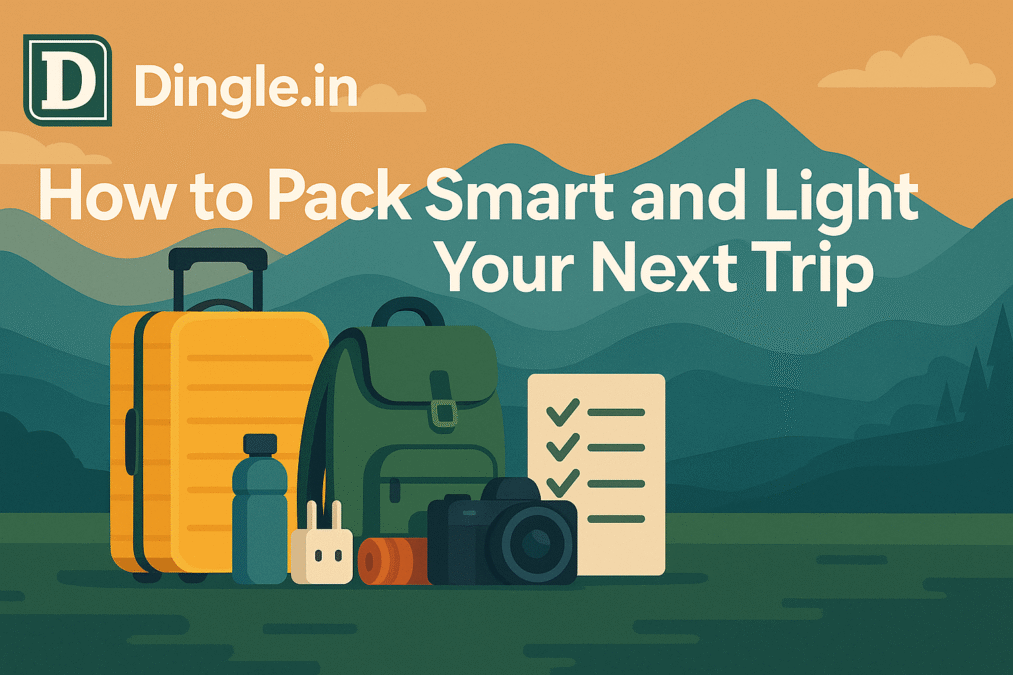
How to Pack Smart and Light for Your Next Trip?
Traveling can be fun, but packing for a trip? Not always. The trick is to pack efficiently and smart. With a little planning, you can avoid stress and enjoy your journey without dragging along unnecessary stuff.
Start by packing light. Choose clothes that can be mixed and matched easily. Go for outfits that suit different occasions and the weather at your destination. It’s better to carry a few versatile pieces than stuff your bag with “just in case” clothes you’ll never wear.
Weather plays a big role in packing. Always check the forecast before you leave. Whether it’s sunny beaches or chilly mountains, bring clothes that match the conditions. And don’t forget essential toiletries, medications, and your usual personal care items in travel-sized containers to save space.
Technology is part of every trip now. Pack your gadgets, but more importantly, remember their chargers. Different countries may have different plug types, so bring a universal travel adapter too. It’s a small item that saves big headaches.
A reusable water bottle is a travel must-have. It keeps you hydrated and cuts down on plastic waste. For daily sightseeing, carry a light daypack, it’s perfect for holding your bottle, wallet, camera, or snacks while you’re out exploring.
Before you fly, check the airline’s baggage rules. Every airline has different size and weight limits, and going over them could cost you extra fees. For short trips, consider skipping the big suitcase and going with just a carry-on. It’s faster, easier, and you won’t have to wait at baggage claim.
Lastly, use a checklist. It helps you pack only what you need and avoids last-minute panic. A simple list can make sure you don’t forget essentials like your passport, medications, or charging cables. Travel smart. Pack smart. And make space for memories, not just things.
Travel Documents You Must Prepare Before Any Trip
Before any trip, it’s important to get your travel documents in order. It may not be the most exciting part of traveling, but it’s one of the most important. Missing papers can ruin your plans before they even begin.
Start by gathering all your key documents. Keep your passport, visa (if needed), flight tickets, and hotel bookings in one place. It’s a good idea to have both physical and digital copies. You can store digital versions on your phone or email for quick access.
Check your passport’s expiry date well in advance. Many countries require it to be valid for at least six months beyond your return date. If needed, apply for a new one early to avoid last-minute stress.
If your destination requires a visa, apply for it in time. Some visas take a few days, others a few weeks. So, plan ahead and check the entry rules of the country you’re visiting.
Travel insurance is another must. Choose a plan that covers health issues, trip cancellations, and lost luggage. It brings peace of mind and can save you money if things go wrong.
Make photocopies of your ID, passport, travel insurance, and important bookings. Also, keep a list of emergency contact numbers. Carry one set of copies with you and leave another with someone you trust at home. This way, if you lose anything, you’re still prepared. Getting your documents ready may take a little effort, but it keeps your trip smooth and stress-free. A little planning goes a long way when it comes to travel safety.
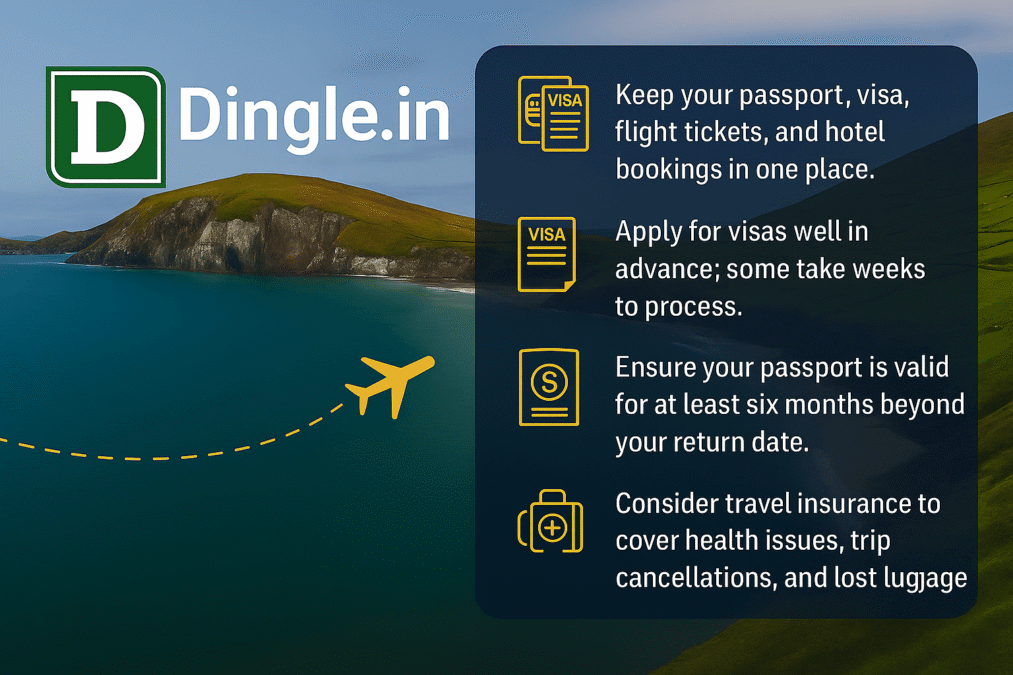
What is a Visa?
A visa is an official document, permission or stamp in your passport that allows you to enter, stay in, or leave a country for a specific purpose (e.g., tourism, work, study).
Each nation’s government or immigration department gives out visas for entry to visitors. They often carry out this activity through an embassy, consulate or the immigration office.
Common Types of Visas
- Tourist Visa: You use this visa to travel for vacation. You can also use it for sightseeing. Or, you can use it to visit family and friends.
- Transit Visa: This visa lets you pass through a country. You use it when you are going to another country.
- Student Visa: You need this visa to study full-time. This is for schools in a foreign country.
- Work Visa: This visa lets you work legally in a foreign country. Often, an employer helps you get this visa.
- Business Visa: You use this visa to attend business meetings. You can also use it for conferences. Or, you can use it to talk about contracts.
How to get Visa?
For getting Visa, Visit the official website of the embassy or consulate of the country you want to visit. Upload or give the required documents and Complete the Visa Application Form.
Remember, some country has unique different procedure for issuing visa to the visitors.
If required Schedule a Visa Appointment. Visit their embassy or visa centre for an interview and biometric data. Attend the Visa Interview. If approved, your visa will be stamped or affixed in your passport.
Remember, always check and visit official government or embassy websites. Don’t rely or depend on third party agents unless they’re trusted. Be careful of visa scams.
What is Electronic Visa or e-Visa?
To save time and efforts of traveller, E-Visa is developed. For getting E-Visa one should visit and apply online. After uploading documents online and one has to pay visa fee online.
Once visa is approved, applicant is informed via email. Visa stamp on passport is not required in case of E-Visa. Approval letter is which is sent on email enough and if required one should print it out and keep it with passport.
An electronic visa (e-Visa or eVisa) or Electronic travel authorization (or ETA) is stored in a computer and is linked to the passport number so no label, sticker, or stamp is placed in the passport before travel.
Here is a list of countries which provide e-Visa facility to Indian nationals as provided by Ministry of External affairs, Government of India.
What is Visa on Arrival (VoA) ?
Some countries give special kind of Visa, called Visa on Arrival (VoA). You don’t apply for this visa before you travel. Instead, you simply fly to the country. You then get your visa when you arrive at the airport or border crossing by paying visa fee.
Why Countries Offer Visa on Arrival (VoA) ?
Some countries give visitors a Visa on Arrival. They do this for several reasons.
It makes it easier for people to visit. This helps their tourism industry grow.
Another reason is to promote business and trade. It encourages business travellers. This can lead to more business, trade and economic growth.
Some countries also offer it to build friendly relations between countries. This can make international relations stronger.
Indian citizens are eligible to obtain a visa on arrival in 62 countries.
It is mostly a matter of presenting a valid passport, onward or return ticket, accommodation, and sufficient funds.
Some popular destinations are:
Thailand:
Thailand offers Indian tourists a 15-day Visa on Arrival (VoA).
Maldives:
The Maldives provides a 30-day VoA.
Indonesia:
Indonesia grants a 30-day VoA.
Sri Lanka:
Sri Lanka allows VoA if you have a prior Electronic Travel Authorization (ETA).
Vietnam:
Vietnam requires you to have a pre-approved visa letter for VoA.
Other countries: Jordan, Bahrain, Ethiopia, Madagascar, Marshall Islands, Rwanda, and Zimbabwe, among others, also offer VoA.
Here you can find list of countries which provides Visa on Arrival to Indian Passport holders as provided by Ministry of External affairs, Government of India.
What is Visa-Free Entry?
You can travel to some specific country without getting Visa. You just carry a valid passport with you. On arrival, your passport is inspected by immigration officials. They normally stamp you in.
Most countries often have agreements with each other for visa-free travel. These will be for limited periods of stay, e.g., 30 or 90 days. You would still need to obey the immigration law of the country.
At present there currently 25 countries which provide Visa free entry for Indian passport holder nationals as found on official website of Ministry of External affairs, Government of India..
Summary
| Entry Type | Apply Before Travel? | Issued Where? | Duration | Risk of Rejection |
|---|---|---|---|---|
| Visa on Arrival | ❌ No | Airport/border | Short (15–60d) | Low, but possible |
| e-Visa | ✅ Yes (Online) | Email/Online | Short–Medium | Moderate (if docs missing) |
| Visa-Free | ❌ No | Not needed | Short–Long | None |
How to Manage Your Money While Traveling?
Handling your money wisely during a trip can help you enjoy more and worry less. With some simple planning, you can stay within your budget and avoid unwanted surprises.
Start by creating a budget. Think about how much you’ll need for food, transport, sightseeing, and maybe a few souvenirs. Try to set a daily spending limit. This will help you control your expenses and avoid running out of money too soon.
Remeber, to carry extra 20% more then your budget. This will help in case of emergency or unexpected, unplaned expenses.
When it comes to payment, carry a mix of options. Bring some local currency for small purchases, like street food or tips. Use a credit card that doesn’t charge foreign transaction fees for bigger expenses. Also, carry a backup card in case one gets lost or blocked.
Please note that whenever you use your debit or credit card overseas or in foreign country, your bank charges around 2% to 5% as markup charges. This means whatever you spend, it will cost you 2% to 5% more per transactions. This rate very by bank to bank.
A markup charge (also known as a foreign currency markup fee or foreign transaction fee) is an extra charge that your bank or card issuer adds when you make purchases in a foreign currency while traveling abroad or shopping online from international merchants.
To avoid this there are Forex Card available which are basically a prepaid card. You can use this Forex Card as your regular debit card or credit card. Only difference is that Forex Card is a prepaid card. You use it up to its limit. Once empty, you can top up this Forex Card from net banking or from you banking app. Most of the Forex card does not charge mark up or transaction charges. Therefore get a forex card during your foreign trip.
Before you travel, inform your bank about your trip. Let them know where you’re going and for how long. This helps prevent your card from getting frozen due to suspected fraud when they see charges from another country. With smart money planning, your trip can be smooth, safe, and more enjoyable. You’ll be ready for fun, not financial problems.
A Forex Card (short for Foreign Exchange Card) is a prepaid travel card. This allows you to load foreign currency (like USD, EUR, GBP, etc.) and use it abroad just like a debit or credit card. It’s specially designed for international travel. Forex Card is one of the most convenient and cost effective way for travelers to carry money overseas.
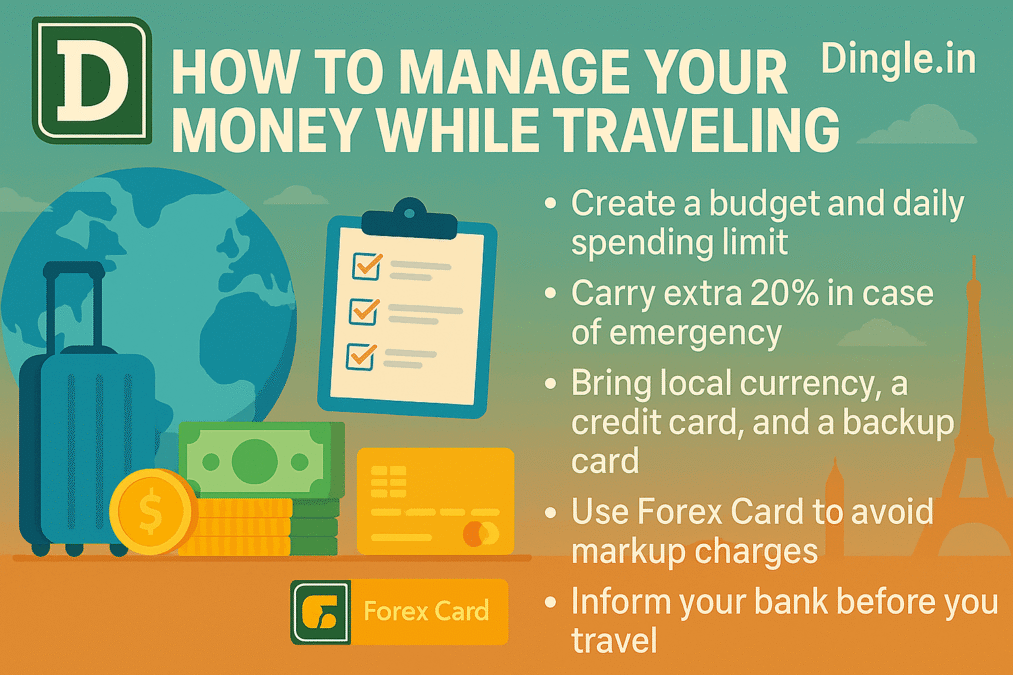
Things to Do Before You Leave for Your Trip?
Getting ready to travel isn’t just about packing bags. There are a few important things to take care of before you leave home. A little preparation helps you travel with peace of mind.
Start by getting your home ready. If you have pets, arrange for someone to care for them. Pause any mail deliveries so your mailbox doesn’t overflow. Before stepping out, make sure all doors and windows are locked. It’s also a good idea to unplug appliances to save energy and avoid any risks while you’re away.
After booking a ticket for a airtravel, before flight when you confirm that you are ready to board the flight this process is called Check In. You can check in via Online or at the airport check in counter. When you check in via Online, your boarding pass is generated and send to you via email or via app or WhatsApp message. When you check in at the airport, check in counter will provide you a boarding pass.
Check in for your flight online if possible. It saves time at the airport and lets you choose your seat in advance. Some airlines even offer discounts or benefits for early check-ins.
Remember to reach airport before 2-3 hours of your scheduled flight time, considering security and imigration check time at airport. Carry you ID, such as Aadhar, Passport, PAN Card, Boarding Pass with you while entry at airport.
You must have seen long ques at the entry of Airport. This is due to ticket and ID check up at the entry of Airport. To avoid this Government of India has introduced a digital identification system at Airport called as “DigiYatra”.
Digi Yatra is a Ministry of Civil Aviation-led initiative in India that aims to streamline the air travel process by using facial biometrics to verify passenger identities at various airport checkpoints, according to DigiYatra Foundation. It eliminates the need for physical documents like ID and boarding passes, making the journey more seamless and efficient.
To avail this service you need to install digiyatra app on your mobile phone. After this verify your identiy via Aadhar verification service. Then upload your boarding pass in the app. Now whenever you enter airport, take digiyatra entry gate. At the gate your face will be scanned by camera at the gate. Within a second this gets done and you are allowed to enter Airport without showing valid Physical documents. This save your valueble time. You will feel like getting special treatment when at get just looking at the camera will let you injust like a VIP.
Before you go, confirm all your bookings. Check your flight details, hotel reservations, and any activities or tours you’ve planned. Make sure everything is in order so there are no surprises when you arrive.
Taking care of these small steps will make your trip smoother and more relaxed. You’ll be ready to enjoy your journey knowing everything back home is under control.
Easy Health and Safety Tips for Your Trip
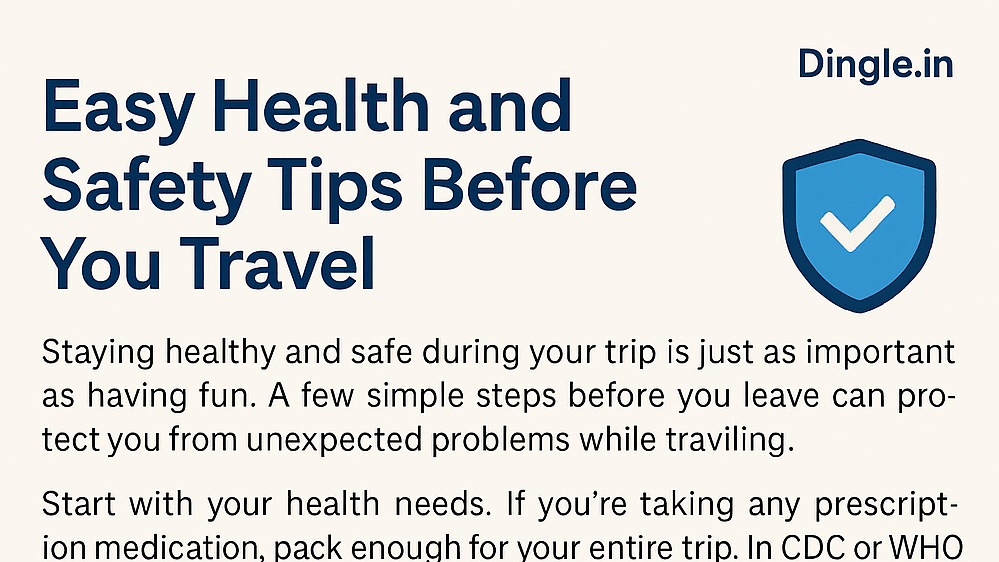
Staying healthy and safe during your trip is just as important as having fun. A few simple steps before you leave can protect you from unexpected problems while traveling.
Start with your health needs. If you’re taking any prescription medication, pack enough for your entire trip. Bring a doctor’s note, especially if you’re flying internationally. It helps avoid issues at customs. Also, check trusted websites like the CDC or WHO to see if any vaccines are needed for your destination.
A small first aid kit can be a big help. Pack basic items like bandages, pain relievers, and any personal care products you might need. It’s always better to be prepared for minor cuts, headaches, or allergies.
Just like a health insurance or a life insurance, travel insurance provides financial protection during a travel in case of theft, hospital bills, lost baggage, and other such problems which may arrive during a travel. It cost about 2% to 5% of your trip cost. Different insurance provider companies has different rates as well as coverage. In my opinion a travel insurance is a must, especially if you are travelling during international trips. While on a trip, a travel insurance give you peace of mind. In case of theft, health issues, luggage theft or other such travel risk, a travel insurance saves you from big expenses.
Remember, If you are going to a region or a foreign area where you feel unsafe or in high risk area, you should register or inform with your country’s embassy. This will help you in case of emergency and they can assist you when needed. Furthermore, once you check your embassy online or offline, you can get information about any specific requirement or travel advisories. Always save local emergency numbers on your phone and also in a pocket diary. This will help you in case of emergency such as theft or even in case when some pickpockets or local goons stole your mobile and other valuable belongings of yours.
A little preparation before any trip would help you throughout your travel itinerary. Taking care of your health and safety before your trip helps you relax and enjoy every moment with confidence.
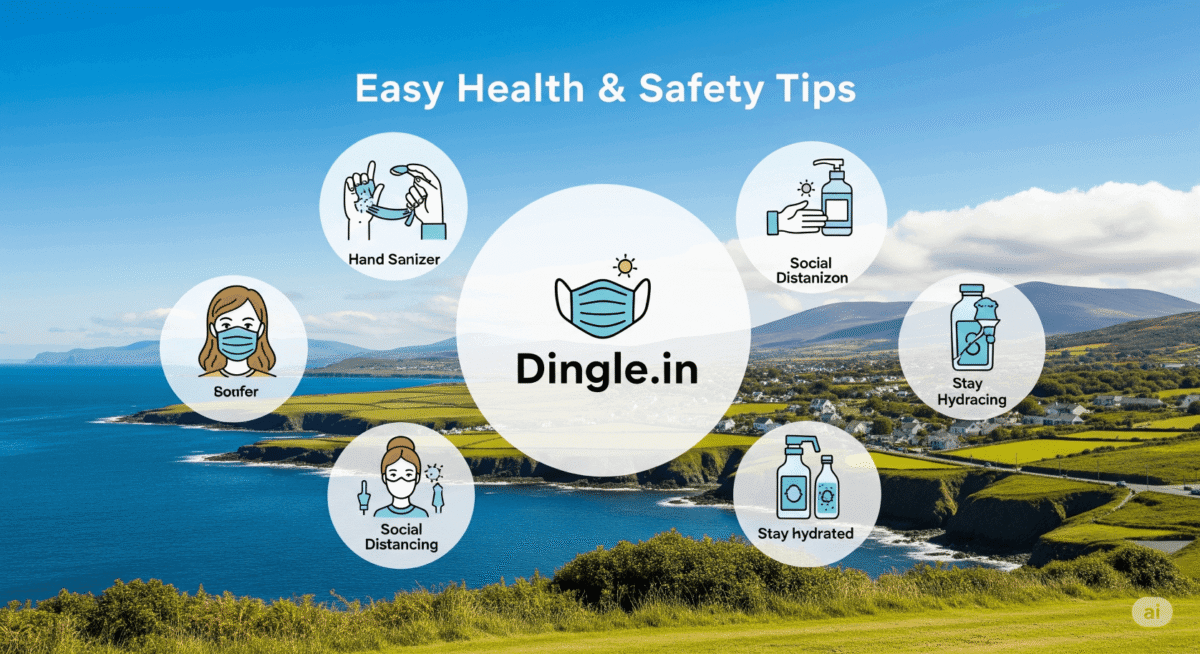
What happens at the airport and after you arrive?
Traveling can be exciting, but it helps to know what to expect at the airport and beyond. A little planning and the right mindset can make your journey much smoother.
Arrive at the airport early. For international flights, it’s best to reach at least 2 to 3 hours before departure. This gives you enough time for check-in, security checks, and finding your gate. Keep your passport, boarding pass, and other travel documents ready and easy to access.
Before your trip, look up transport options from the airport to your destination. Some airports offer trains, buses, taxis, or rideshare services like Uber. Knowing your choices helps you avoid confusion and saves time when you arrive.
Travel plans don’t always go perfectly. Flights may get delayed, routes may change, or things may not go as planned. Try to stay calm and flexible. A positive attitude can make unexpected changes easier to handle.
Lastly, check for local health guidelines or COVID-19 rules before you travel. Some places may have mask rules, testing requirements, or other safety advice. Staying informed helps you stay safe and avoid problems.
With a little patience and planning, you’ll be ready to handle the airport and enjoy your journey ahead.
Stay Connected and Safe While Traveling
Staying connected and secure during your trip is just as important as planning where to go. With the right tools and a few smart steps, you can enjoy your journey without worry.
Before you leave, download helpful travel apps. Offline maps like Google Maps can guide you even without internet. Translation apps such as Google Translate can help you communicate if you’re visiting a place where you don’t speak the language. Travel guide apps are also useful for finding places to eat, visit, or stay.
Think about how you’ll stay connected. You can get a local SIM card at your destination or choose an international roaming plan before you leave. Having mobile data makes it easier to use maps, contact people, or get help if needed.
Keep your important information saved in more than one place. Write down the address of your hotel, important phone numbers, and your travel plans. Save these offline or in a travel app so you can access them anytime, even without internet.
It’s also smart to let someone you trust know your travel itinerary. This adds a layer of safety. In case of an emergency, someone will know where you are supposed to be.
Carry a small amount of emergency cash and have more than one way to pay, like a card and a digital wallet. This keeps you covered in case one method doesn’t work. Whether you’re traveling for fun, business, or adventure, staying connected and secure lets you focus on enjoying the experience.
Conclusion
Wherever your travels will take you, preparation really helps. Whether you’re taking a bus, catching a flight, or booking through a travel agency, every detail counts. From choosing the right destination with high tourist attractiveness to packing your suitcase smartly, organizing your visa and airline ticket, and consulting a travel agent, each step ensures your travel goes smoothly. Whether it’s a quick day trip just a few kilometers away or long distance business travel, managing your time by the hour, your money, and your travel insurance adds peace of mind. Remember, speed and preparation go hand in hand. So grab your bag, plan with purpose, and let every journey become a memorable part of your travel story!
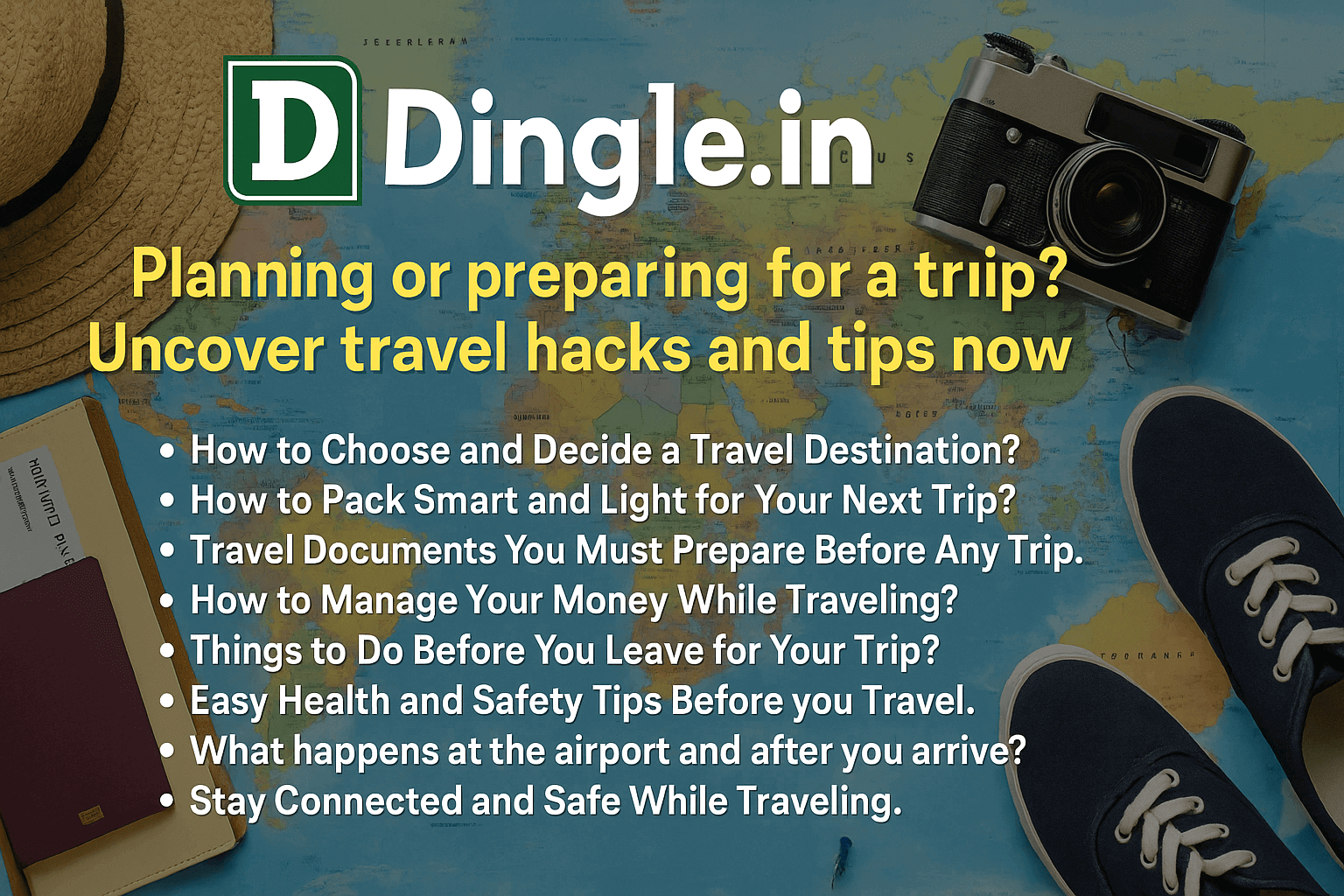
bfpqy6
credited his charitable spirit to his education [url=https://en.wikipedia.org/wiki/Chuck_Feeney/]https://en.wikipedia.org/wiki/Chuck_Feeney/[/url] .
Great information shared.. really enjoyed reading this post thank you author for sharing this post .. appreciated
Если у вас нет своей базы хрумер, то можно воспользоваться готовыми вариантами от проверенных поставщиков.
договор охранных услуг [url=https://rabochiy.site/]rabochiy.site[/url] .
Идеальные источники бесперебойного питания для дома, получите информацию.
Обзор источников бесперебойного питания, читайте.
Преимущества использования ИБП, в нашем материале.
Топ-5 ИБП для защиты техники, читайте.
Как выбрать идеальный источник бесперебойного питания, получите советы.
Как не ошибиться при выборе ИБП, в нашем блоге.
Обзор актуальных источников бесперебойного питания, в нашем гиде.
Технические аспекты ИБП, в нашем материале.
Эффективное использование ИБП, здесь.
Что нового в мире ИБП, узнайте.
Правила подключения источника бесперебойного питания, на сайте.
Идеальные источники бесперебойного питания для бизнеса, читайте.
Как выбрать оптимальный ИБП, в статье.
Рейтинг популярных источников бесперебойного питания, читайте.
Как установить источник бесперебойного питания?, в статье.
Обзор популярнейших источников бесперебойного питания, читайте.
Устранение неисправностей ИБП, в статье.
Сравнение моделей источников бесперебойного питания, в статье.
Топ-10 источников бесперебойного питания на рынке, в гиде.
источники бесперебойного питания цена [url=istochniki-bespereboynogo-pitaniya.ru#источники-бесперебойного-питания-цена]istochniki-bespereboynogo-pitaniya.ru[/url] .
Идеальный подарок — гелиевые шары с доставкой, позвоните сейчас.
Гелиевые шарики Нижний Новгород [url=http://www.shariki-shop47.ru]http://www.shariki-shop47.ru[/url] .
Как оформить разрешение на работу, для иностранцев, обязательно нужно знать.
Разрешение на работу за границей: основные моменты, полезная информация.
Все о Разрешении на работу, анализируем.
Что делать, если истекает разрешение на работу, по юридическим вопросам.
Как студенту получить разрешение на работу, необходимые документы.
Ошибки при получении разрешения на работу, полезная информация.
Разрешение на работу в разных странах, особенности.
Документы для получения разрешения на работу, проверьте документы.
Как получить разрешение на работу без отказа, полезные рекомендации.
Что нужно знать о своих правах при получении разрешения на работу, полный обзор.
Как долго ждать разрешение на работу, все о сроках.
Разрешение на работу для фрилансеров, полезные советы.
Проверка готовности разрешения на работу, советы по проверке.
Специальные условия для родителей-одиночек, рекомендации.
Советы по интервью для разрешения на работу, полезные советы.
Разрешение на работу и налоги, важные аспекты.
Работа с инвалидностью: разрешение на работу, лучшие практики.
Услуги по оформлению разрешения на работу: что нужно знать, полезные советы.
Как переехать за границу с разрешением на работу, подготовка.
Работа и кризис: разрешение на работу, важные советы.
разрешение на работу иностранным гражданам [url=https://www.oformleniernr.ru/#разрешение-на-работу-иностранным-гражданам]https://www.oformleniernr.ru/[/url] .
official site of red cross [url=http://www.care-people-help.org]official site of red cross[/url] .
vardenafil 20mg tablet [url=https://levinevino.com]vardenafil tablet online[/url] levitra to buy
levitra 100mg price costco levitra price levitra 20mg
mt7wl3
Magnificent beat I would like to apprentice while you amend your site how can i subscribe for a blog web site The account helped me a acceptable deal I had been a little bit acquainted of this your broadcast offered bright clear idea
Самые популярные скины в продаже, здесь.
новинки, вас поразят.
Изучите, доступны.
новые тренды.
эксклюзивные скины.
фанатов.
в нашем магазине.
с лучшими предложениями.
Получите.
актуальную информацию о скинах, которые.
разные стили скинов, по вашему выбору.
для выгодных сделок.
эксклюзивные предложения.
Изучите, как, чтобы не упустить возможности.
новые поступления, что.
уникальными скинами, что сделает вас особенным.
Покупая у нас, вы получаете.
актуальные скины, по лучшей цене.
skins cs [url=https://www.superskinscs.com#skins-cs]https://www.superskinscs.com[/url] .